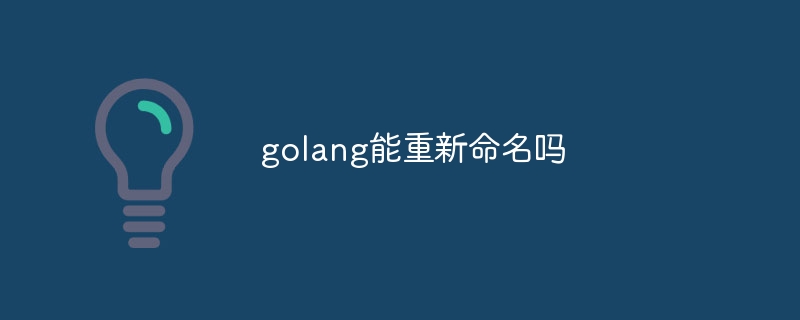
Golang cannot be renamed. Although golang does not have a direct renaming function, variables, functions, types, etc. can still be renamed through indirect methods such as structure nesting and type aliases. This indirect implementation may result in some additional complexity and overhead, so there are trade-offs in practical applications. As an emerging programming language, golang's design goal is to provide a simple, efficient and reliable programming experience. The non-provision of renamed functions may be due to this goal.

The operating environment of this article: Windows 10 system, go1.20 version, DELL G3 computer.
Golang (also known as Go language) is an emerging open source programming language developed by Google in 2007. The design goal of Golang is to provide a simple, efficient, and reliable programming language that can be used to build large-scale software systems. As a statically typed programming language, Golang has many unique features, such as garbage collection, coroutines, native support for concurrency, etc., which has made it receive widespread attention and love from developers in recent years.
However, as a relatively young programming language, Golang still has some imperfections, one of which is support for renaming. Renaming is a common programming requirement in other programming languages, allowing developers to rename a variable, function, type, etc. to another name. This plays an important role in program refactoring, readability improvement, and code maintenance.
However, in Golang, renaming is not as simple as in other programming languages. The designers of Golang believed that renaming could introduce unnecessary complexity and confusion, so they decided not to provide direct support for renaming in the design of the language.
So, is there no way to achieve renaming in Golang? the answer is negative. Although Golang does not have a direct renaming function, developers can indirectly achieve the renaming effect through other methods.
The first method is to use structure nesting. By embedding the original type into a structure and defining the corresponding functions and methods in the structure, the renaming effect can be achieved indirectly. For example, assuming we have a type named `MyInt`, we can create a structure `MyIntWrapper`, embed `MyInt` into the structure, and define the corresponding functions and methods in `MyIntWrapper`. In this way, we can directly use `MyIntWrapper` instead of `MyInt` to achieve renaming.
Another approach is to use type aliases. Golang allows developers to create custom type aliases using the `type` keyword. By creating a type alias, we can define a new name for an existing type. This way, we can rename it by using the new name instead of the original type name. However, it should be noted that type aliases are only valid within the scope of the program and cannot replace the original type name globally.
Although Golang does not have a direct renaming function, we can still rename variables, functions, types, etc. through indirect methods such as structure nesting and type aliases. Of course, this indirect implementation may result in some additional complexity and overhead, so there are trade-offs in practical applications. In any case, Golang, as an emerging programming language, is designed to provide a simple, efficient and reliable programming experience. The non-provision of renamed functions may be due to this goal. When developing in Golang, developers should choose the appropriate method to implement functions similar to renaming based on the actual situation.
The above is the detailed content of Can golang be renamed?. For more information, please follow other related articles on the PHP Chinese website!